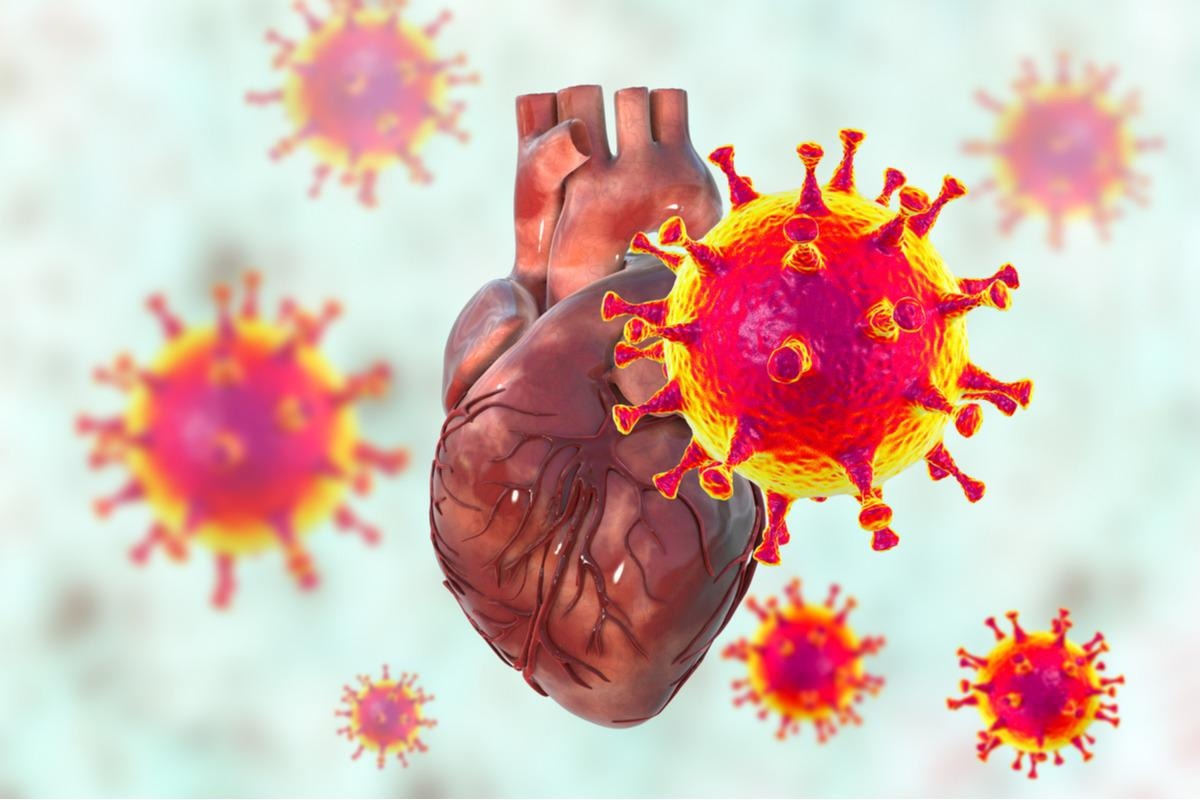The coronavirus disease 2019 (COVID-19) has been caused by the rapid outbreak of the severe acute respiratory syndrome coronavirus 2 (SARS-CoV-2). Cardiac injury is a prevalent complication associated with COVID-19. However, the molecular basis for this phenotype is not clear.
 Study: Genetic alteration of human MYH6 is mimicked by SARS-CoV-2 polyprotein: mapping viral variants of cardiac interest. Image Credit: Kateryna Kon/Shutterstock
Study: Genetic alteration of human MYH6 is mimicked by SARS-CoV-2 polyprotein: mapping viral variants of cardiac interest. Image Credit: Kateryna Kon/Shutterstock
Scientists have hypothesized that molecular mimicry may play a crucial role in causing an autoimmune inflammatory response in some COVID-19 patients. A new study has been published on the bioRxiv* preprint server that studied whether linear peptides contained in proteins (primarily expressed in the heart) also occur in the SARS-CoV-2 proteome.

 This news article was a review of a preliminary scientific report that had not undergone peer-review at the time of publication. Since its initial publication, the scientific report has now been peer reviewed and accepted for publication in a Scientific Journal. Links to the preliminary and peer-reviewed reports are available in the Sources section at the bottom of this article. View Sources
This news article was a review of a preliminary scientific report that had not undergone peer-review at the time of publication. Since its initial publication, the scientific report has now been peer reviewed and accepted for publication in a Scientific Journal. Links to the preliminary and peer-reviewed reports are available in the Sources section at the bottom of this article. View Sources
Cardiac injury and COVID-19
Many studies have documented the prevalence of cardiac injury associated with COVID-19. In a small number of cases, myocarditis has been reported after receiving an mRNA COVID-19 vaccine. However, the mechanisms underlying myocardial inflammation during COVID-19 infection and vaccination remain unknown. Molecular mimicry is one hypothesis that states that T lymphocytes and/or antibodies recognizing SARS-CoV-2 antigens and mediating virus neutralization may react with host cardiac proteins and trigger an autoimmune response against cardiomyocytes.
Advances in sequencing technologies have aided the development of large-scale multi-omic datasets and genomic epidemiology resources. These new resources have elucidated the transcriptional signatures of many healthy human tissues and cell types. Over 200 countries have contributed more than 4.85 million SARS-CoV-2 genomes to the GISAID database. Such large-scale datasets have enabled researchers to study the potential for molecular mimicry between human cardiac proteins and SARS-CoV-2.
Key findings
Scientists compared the library of 136,704 8-mer peptides from 144 human proteins to 9,926 8-mers from all 17 viral proteins in the reference SARS-CoV-2 proteome. The human proteins included splicing variants as well. Analysis revealed that no 8-mers were identical between the SARS-CoV-2 proteome and the human reference proteome. It was, however, interesting to note that 45 8-mers differed by only one amino acid.
Protein-coding mutations from 141,456 individuals were analyzed, and the results obtained showed that one of these 8-mers from the SARS-CoV-2 Replicase polyprotein 1a/1ab (KIALKGGK) was exactly identical to an MYH6 peptide encoded by the c.5410C>A (Q1804K) genetic variation. This genetic variation has low prevalence in many sub-groups. For example, 0.08% of Africans/African Americans, 0.3% of East Asians, 0.06% of South Asians, and 0.003% of Latino/Admixed Americans show this genetic variation.
Scientists have further analyzed 4.85 million SARS-CoV-2 genomes from over 200 countries and showed that viral evolution has resulted in 20 additional 8-mer peptides. These peptides are identical to human heart-enriched proteins encoded by reference sequences or genetic variants. Future research will need to reveal if such mimicry causes cardiac inflammation during or after COVID-19 illness.
Scientists recommended a deeper investigation of SARS-CoV-2 variants that harbor peptides identical to human cardiac proteins as ‘viral variants of cardiac interest’. The potential for molecular mimicry between the antigen encoded by mRNA vaccines and human cardiac proteins should also be studied, given the occurrence of myocarditis in some individuals shortly after receiving an mRNA-based COVID-19 vaccine.
Limitations
Firstly, the surveyed human proteins were selected based on their overexpression in cardiac tissue. Mimicked proteins may be shared between cardiac tissues and other tissues, and these were not accounted for in the current analysis. Secondly, other mechanisms (e.g., bystander activation, epitope spreading, and viral persistence) could lead to autoimmunity after viral infection. Thirdly, it could be a matter of pure chance that identical peptides are present in cardiac proteins and the SARS-CoV-2 proteome. Lastly, it could also well be the case that peptides with lesser degrees of similarity could contribute to immunologic mimicry.
Conclusion
By analyzing the overlap between human genetic variation in cardiac proteins and SARS-CoV-2 evolution, scientists have identified molecular mimicry candidates. These candidates possess the potential to contribute to cardiac inflammation during COVID-19 disease. Follow-up functional studies to determine the potential of SARS-CoV-2 reactive T cells and antibodies to cross-react with these peptides will be crucial. Researchers have also highlighted that this strategy could be generalized to identify and categorize possible mimicry candidates from a wide variety of human tissues affected by other autoimmune responses in individuals with COVID-19.

 This news article was a review of a preliminary scientific report that had not undergone peer-review at the time of publication. Since its initial publication, the scientific report has now been peer reviewed and accepted for publication in a Scientific Journal. Links to the preliminary and peer-reviewed reports are available in the Sources section at the bottom of this article. View Sources
This news article was a review of a preliminary scientific report that had not undergone peer-review at the time of publication. Since its initial publication, the scientific report has now been peer reviewed and accepted for publication in a Scientific Journal. Links to the preliminary and peer-reviewed reports are available in the Sources section at the bottom of this article. View Sources